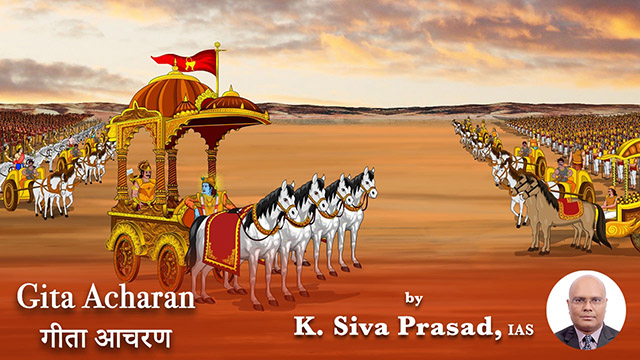
Krishna says, "He who neither rejoices nor hates, nor grieves, nor desires, renouncer of good and evil, alike to friend and foe; to honour and dishonour, alike to experiences of warmth and chill, to pleasure (𝙨𝙪𝙠𝙝) and suffering (𝙙𝙪𝙠𝙝) , free from attachment, he who is full of devotion is dearer to me" (12.17 and 12.18). Essentially, it is witnessing these feelings and emotions rather than identifying with them.
A newborn is a 'universal baby' with many free neurons in the brain to take care of future requirements and challenges. During the formative years, many neural patterns are formed based on upbringing, family, society etc. These patterns label external situations and people as either good or bad. That's why Krishna earlier suggested that (2.50) endowed with intellect, one sheds both good and bad deeds, which implies that labelling is shed once we attain yoga of equanimity. The same is reflected here that those devotees are dear to HIM who drop these identifications. Once these are dropped there is no honour (praise) or dishonour (criticism) and one experiences warmth and chill alike.
Krishna earlier said that 𝙨𝙩𝙝𝙞𝙩𝙖-𝙥𝙧𝙖𝙜𝙣𝙖 (stoic) is the one who is neither excited by 𝙨𝙪𝙠𝙝 nor agitated by 𝙙𝙪𝙠𝙝 and is free from 𝙧𝙖𝙖𝙜 (attachment) (2.56). All of us seek pleasure but suffering inevitably comes to our lives as both of them exist in pairs of 𝙙𝙬𝙖𝙣𝙙𝙬𝙖 (polar). This is like bait to fish where the hook is hidden behind the bait. Life experiences give us awareness that when we seek one, the other is bound to follow -maybe in a different shape and after a lapse of time. This awareness helps us transcend polarities and attain the state of equanimity (𝙨𝙖𝙢𝙖𝙩𝙫𝙖) . It's like being an artist in a drama who displays intense emotions but doesn't get attached to them.

